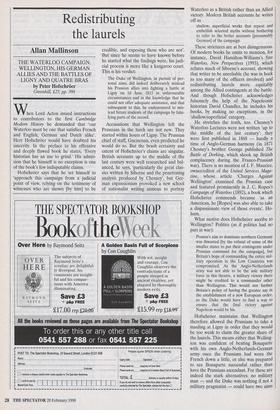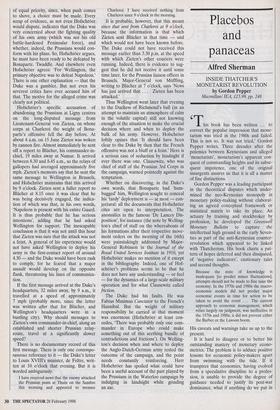Redistributing the laurels
Allan Mallinson
THE WATERLOO CAMPAIGN: WELLINGTON, HIS GERMAN ALLIES AND THE BATTLES OF LIGNY AND QUATRE BRAS by Peter Hofschriier
Greenhill, £25, pp. 398
hen Lord Acton issued instructions to contributors to the first Cambridge Modern History he demanded that 'our Waterloo must be one that satisfies French and English, German and Dutch alike'. Herr Hofschroer would have doubted his sincerity. In the preface to his offensive and deeply flawed book he states, 'Every historian has an axe to grind.' His admis- sion that he himself is no exception is one of the book's few indisputable claims.
Hofschroer says that he set himself to `approach this campaign from a judicial point of view, relying on the testimony of witnesses who are shown [by him] to be credible, and exposing those who are not'. But since he seems to have known before he started what the findings were, his judi- cial process is more like a kangaroo court. This is his verdict:
The Duke of Wellington, in pursuit of per- sonal aims, did indeed deliberately mislead his Prussian allies into fighting a battle at Ligny on 16 June 1815 in unfavourable circumstances and in the knowledge that he could not offer adequate assistance, and that subsequent to this, he endeavoured to mis- lead future students of the campaign by falsi- fying parts of the record.
Accusations that Wellington left the Prussians in the lurch are not new. They started within hours of Ligny. The Prussian chief of staff, Gneisenau, even predicted he would do so. But the brash certainty and extent of Hofschroer's claims are singular. British accounts up to the middle of the last century were well researched and bal- anced, he says, 'particularly the great clas- sics written by Siborne and the penetrating analysis produced by Chesney', but Ger- man expansionism provoked a new school of nationalist writing anxious to portray Waterloo as a British rather than an Allied victory. Modern British accounts he writes off as
shallow, superficial works that repeat and embellish selected myths without bothering to refer to the better accounts [presumably German] of the campaign.
These strictures are at best disingenuous. Of modern books he omits to mention, for instance, David Hamilton-Williams's fine Waterloo, New Perspectives (1993), which refutes much of Siborne's account, showing that writer to be unreliable (he was in hock to too many of the officers involved) and redistributing laurels more equitably among the Allied contingents at the battle. And though HofschrOer acknowledges fulsomely the help of the Napoleonic historian David Chandler, he includes his books, by making no exceptions, in the `shallow/superficial' category.
He stretches the truth, too. Chesney's Waterloo Lectures were not written `up to the middle of the last century': they were first published in 1868 — hardly a time of Anglo-German harmony (in 1871 Chesney's brother George published The Battle of Dorking, which shook up British complacency during the Franco-Prussian war). There is no mention of J. F. Maurice, owner/editor of the United Services Maga- zine, whose article 'Charges Against Wellington' examined the Prussian case and featured prominently in J. C. Ropes's Campaign of Waterloo (1892), a book which HofschrOer commends because 'as an American, he [Ropes] was also able to take a dispassionate view of those events'. Ho- hum.
What motive does Hofschroer ascribe to Wellington? Politics (as if politics had no part in war):
Prussia's aim to dominate northern Germany was thwarted [by the refusal of some of the smaller states to put their contingents under Prussian command for the campaign], but Britain's hope of commanding the entire mil- itary operation in the Low Countries was compromised. As the Anglo-Netherlands army was not able to be the sole military force in this theatre, a military victory there might be credited to a commander other than Wellington. This would not further Britain's policy of having the greater say in the establishment of a new European order, so the Duke would have to fmd a way to ensure that the final victory against Napoleon would be his.
Hofschrber maintains that Wellington therefore allowed the Prussians to take a mauling at Ligny in order that they would be too weak to claim the greater share of the laurels. This means either that Welling- ton was confident of beating Bonaparte with his own Anglo-Netherlands-German army once the Prussians had worn the French down a little, or else was prepared to see Bonaparte successful rather than have the Prussians ascendant. For these are indeed the stark alternatives: no military man — and the Duke was nothing if not a military pragmatist — could have two aims of equal priority, since, when push comes to shove, a choice must be made. Every scrap of evidence, as not even. Hofschroer would dispute, indicates that the Duke was very concerned about the fighting quality of his own army (which was not his old battle-hardened Peninsular force), and whether, indeed, the Prussians would con- form with his plans. So, HofschrOer argues, he must have been ready to be defeated by Bonaparte. Twaddle. And elsewhere even Hofschroer agrees: 'For Wellington, the primary objective was to defeat Napoleon.' There is one other explanation — that the Duke was a gambler. But not even his severest critics have ever accused him of that. The motive for the alleged crime was clearly not political.
HofschrOer's specific accusation of abandoning the Prussians at Ligny centres on the long-disputed message from Lieutenant-General von Zieten, on whose corps at Charleroi the weight of Bona- parte's offensive fell the day before. At about 4 a.m. on 15 June Zieten was woken by cannon fire. Almost immediately he sent off a report to Bliicher, his commander-in- chief, 19 miles away at ,Namur. It arrived between 8.30 and 8.45 a.m., so the relays of gallopers had averaged approximately five mph. Zieten's memoirs say that he sent the same message to Wellington in Brussels, and Hofschroer maintains that this arrived by 9 o'clock. Zieten sent a fuller report to Bliicher at 8.15 once it was clear that he was being decisively engaged, the indica- tion of which was that, in his own words, `Napoleon is present with his entire Guard. It is thus probable that he has serious intentions', adding that he had asked Wellington for support. The inescapable conclusion is that it was not until this hour that Zieten was sure that the attack was not a feint. A general of his experience would not have asked Wellington to deploy his army in the first-contact report of around 4.30 — and the Duke would have been rash to comply, for he feared that a major assault would develop on the opposite flank, threatening his lines of communica- tion.
If the first message arrived at the Duke's headquarters, 32 miles away, by 9 a.m., it travelled at a speed of approximately 7 mph (probably more, since the letter was written after that for Bliicher, and Wellington's headquarters were in a bustling city). Why should messages to Zieten's own commander-in-chief, along an established and shorter Prussian relay- route, travel• at a significantly slower speed?
There is no documentary record of this first message. There is only one contempo- raneous reference to it — the Duke's letter to Louis XVIII's minister, de Feltre, writ- ten at 10 o'clock that evening. But it is worded ambiguously: I have received news that the enemy attacked the Prussian posts at Thuin on the Sambre this morning and appeared to menace
Charleroi. I have received nothing from Charleroi since 9 o'clock in the morning.
It is probable, however, that this meant since that sent from Charleroi at 9 o'clock, because the information is that which Zieten sent Blucher at that time — and which would not have been known before. The Duke could not have received this message earlier than 3.30 p.m. at the speed with which Zieten's other couriers were running. Indeed, there is evidence to sug- gest that he did not receive it until some time later, for the Prussian liaison officer in Brussels, Major-General von Muffling, writing to Blucher at 7 o'clock, says 'News has just arrived that . . . Zieten has been attacked.'
Thus Wellington went later that evening to the Duchess of Richmond's ball (in an attempt to maintain an atmosphere of calm in the volatile capital) still not knowing enough of the situation to make the crucial decision where and when to deploy the bulk of his army. However, HofschrOer loftily opines that 'It should have been clear to the Duke by then that the French offensive was not a bluff or a feint.' Here is a serious case of seduction by hindsight if ever there was one. Clausewitz, who was chief of staff of the Prussian 3rd Corps in the campaign, warned pointedly against the temptation.
Whether on discovering, in the Duke's own words, that Bonaparte had 'hum- bugged' him, Wellington sought to conceal his 'tardy' deployment is — at most — con- jectural: all the documents that Hofschther cites are open to interpretation. The anomalies in the famous 'De Lancey Dis- position', for instance (the note by Welling- ton's chief of staff on the whereabouts of his formations after their respective move- ment orders on the morning of the 16th) were painstakingly addressed by Major- General Robinson in the Journal of the Royal United Services Institute in 1910, yet Hofschroer makes no mention of it except in the bibliography. Indeed, one of Hof- schrOer's problems seems to be that he does not have any understanding — or feel — for the dynamics of a large-scale military operation and for what Clausewitz called friction.
The Duke had his faults. He was Fabius Maximus Cunctator to the French's Hannibal. But the weight of military responsibility he carried at that moment was enormous (Hofschroer at least con- cedes, 'There was probably only one com- mander in Europe who could make something out of this seething bundle of contradictions and frictions'). On Welling- ton's decision when and where to deploy the Anglo-Dutch-German army rested the outcome of the campaign, and the point needs constantly reinforcing. Herr HofschrOer has spoiled what could have been a useful account of the part played by the Prussians in the Waterloo campaign by indulging in hindsight while grinding an axe.



























































 Previous page
Previous page